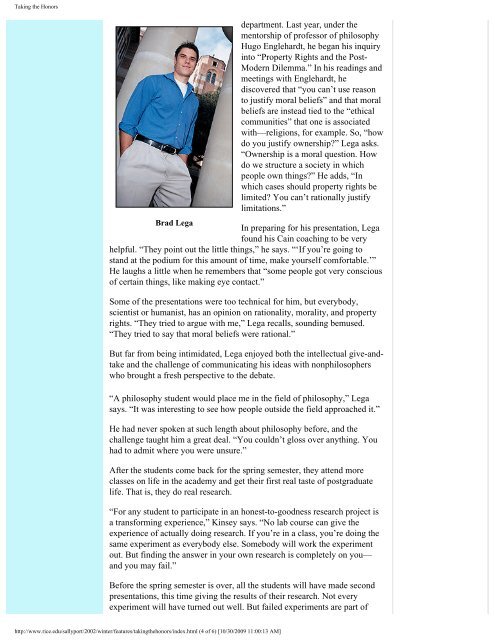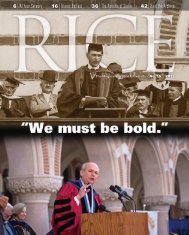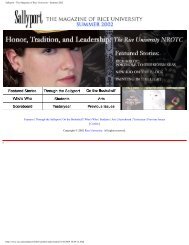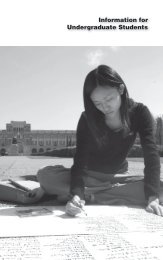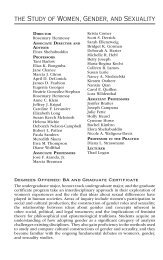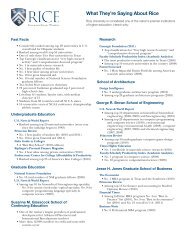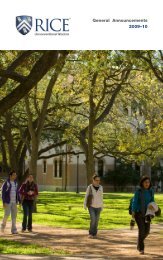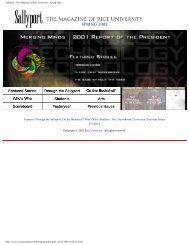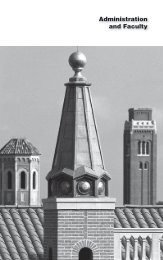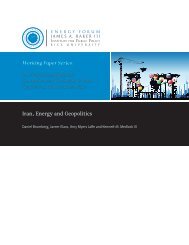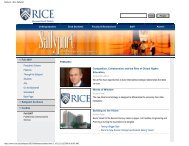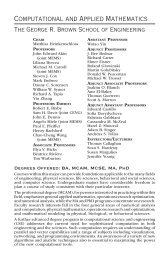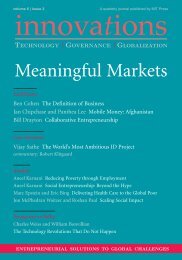Sallyport - The Magazine of Rice University - Winter 2002
Sallyport - The Magazine of Rice University - Winter 2002
Sallyport - The Magazine of Rice University - Winter 2002
Create successful ePaper yourself
Turn your PDF publications into a flip-book with our unique Google optimized e-Paper software.
Taking the Honors<br />
department. Last year, under the<br />
mentorship <strong>of</strong> pr<strong>of</strong>essor <strong>of</strong> philosophy<br />
Hugo Englehardt, he began his inquiry<br />
into “Property Rights and the Post-<br />
Modern Dilemma.” In his readings and<br />
meetings with Englehardt, he<br />
discovered that “you can’t use reason<br />
to justify moral beliefs” and that moral<br />
beliefs are instead tied to the “ethical<br />
communities” that one is associated<br />
with—religions, for example. So, “how<br />
do you justify ownership?” Lega asks.<br />
“Ownership is a moral question. How<br />
do we structure a society in which<br />
people own things?” He adds, “In<br />
which cases should property rights be<br />
limited? You can’t rationally justify<br />
limitations.”<br />
Brad Lega<br />
In preparing for his presentation, Lega<br />
found his Cain coaching to be very<br />
helpful. “<strong>The</strong>y point out the little things,” he says. “‘If you’re going to<br />
stand at the podium for this amount <strong>of</strong> time, make yourself comfortable.’”<br />
He laughs a little when he remembers that “some people got very conscious<br />
<strong>of</strong> certain things, like making eye contact.”<br />
Some <strong>of</strong> the presentations were too technical for him, but everybody,<br />
scientist or humanist, has an opinion on rationality, morality, and property<br />
rights. “<strong>The</strong>y tried to argue with me,” Lega recalls, sounding bemused.<br />
“<strong>The</strong>y tried to say that moral beliefs were rational.”<br />
But far from being intimidated, Lega enjoyed both the intellectual give-andtake<br />
and the challenge <strong>of</strong> communicating his ideas with nonphilosophers<br />
who brought a fresh perspective to the debate.<br />
“A philosophy student would place me in the field <strong>of</strong> philosophy,” Lega<br />
says. “It was interesting to see how people outside the field approached it.”<br />
He had never spoken at such length about philosophy before, and the<br />
challenge taught him a great deal. “You couldn’t gloss over anything. You<br />
had to admit where you were unsure.”<br />
After the students come back for the spring semester, they attend more<br />
classes on life in the academy and get their first real taste <strong>of</strong> postgraduate<br />
life. That is, they do real research.<br />
“For any student to participate in an honest-to-goodness research project is<br />
a transforming experience,” Kinsey says. “No lab course can give the<br />
experience <strong>of</strong> actually doing research. If you’re in a class, you’re doing the<br />
same experiment as everybody else. Somebody will work the experiment<br />
out. But finding the answer in your own research is completely on you—<br />
and you may fail.”<br />
Before the spring semester is over, all the students will have made second<br />
presentations, this time giving the results <strong>of</strong> their research. Not every<br />
experiment will have turned out well. But failed experiments are part <strong>of</strong><br />
http://www.rice.edu/sallyport/<strong>2002</strong>/winter/features/takingthehonors/index.html (4 <strong>of</strong> 6) [10/30/2009 11:00:13 AM]


